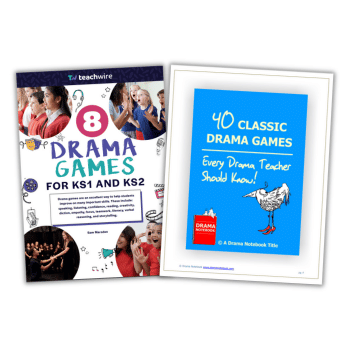2 x drama games PDFs
KS1, KS2
Years 1-6
Want to help your pupils develop skills from empathy to verbal reasoning, but don’t know where to start? Or perhaps you’re a drama teacher looking for new drama games for kids to play?
This download contains 8 quick drama activity ideas from Sam Marsden to spark children’s imaginations, plus 40 classic drama games every teacher should know from Drama Notebook.
From movement to maths
Drama games are an excellent opportunity for kids to improve in many different areas. It’s not just about working on their drama skills.
These games will improve the following skills:
- speaking
- listening
- confidence
- reading
- creativity
- diction
- empathy
- focus
- teamwork
- literacy
- verbal reasoning
- creative thinking
- storytelling
Games are a versatile tool that can be used in many different contexts. They are a staple in drama classes, of course, but can also be helpful in English and even PE, since they involve physical movement.
Some teachers have even adapted them to work for other subjects, including maths, history, geography, and science.
Drama games can also be used as an ice breaker, to inject energy into a lesson, at parties, or as part of a drama workshop.
Creating a safe space for drama games
Before facilitating a drama game, it’s important to set up a safe space where students feel comfortable to share without fear of judgment, or of being forced into doing anything they don’t want to.
Here are five simple ways to create a safe space in your drama lesson so that students are more likely to engage in the drama games in a meaningful way:
- Lay down the ground rules – kindness and good listening are particularly important for drama.
- Never force a drama student to perform in front of the class, or put them on the spot. Always give them the option to say pass and explain this before you start. I find when given this option, after a short amount of time everyone will volunteer to perform.
- Have a clear signal for silence as an imaginative drama activity can get noisy!
- Explain there is no wrong when it comes to improvisation, except for harming someone – physically or emotionally.
- Try and give praise to a pupil if they get up in front of the class and improvise, or at least give them a verbal cue that they did well. This in turn will mean they might push further next time, and it will encourage others to get up and perform.
Classic drama games
There are a wide range of brilliant ideas to choose from in Sam Marsden’s resource pack, from traditional games to ones you’ve never played before. They include:
- The Name Game
- Tableaus
- Counting to 100
- The objective/obstacle exercise
- The letter
- Pass the object
- Making an advert
- Broken-down lift
Each simple game idea comes with full instructions.
The 40 games in Drama Notebook’s resource pack are organised according to goals such as:
- Building ensemble
- Warm-ups
- Focusing
- Imagination and creativity
- Movement
- Characterisation
Many of the games also include specialised or add-on tips and instructions!
Drama game example
Zip Zap Zop is a classic example of drama games for kids. It’s one of the most famous theatre warm-up games, in fact.
To play, stand in a circle. Ask children to practise saying “Zip, Zap, Zop.” One person starts by clapping and pointing to someone as they say, “zip.” The person they pointed to claps, and points to someone else, saying “zap.” The person they pointed to then claps, and points to someone saying “zop.”
Then it starts all over again with the next player clapping and pointing to someone, saying “zip!” The game continues until someone gets out.
If a player says a word out of order, they are out. If a player hesitates too long, they’re out. When a player is out, they can stay in the game, but turn into “land mines” by crossing their arms over their chest. If a player still in the game points to one of the “mines,” they are out too.
Drama Notebook is one of the world’s leading resources for drama teachers. The site features hundreds of drama lesson plans, and royalty-free plays for kids and teens.














